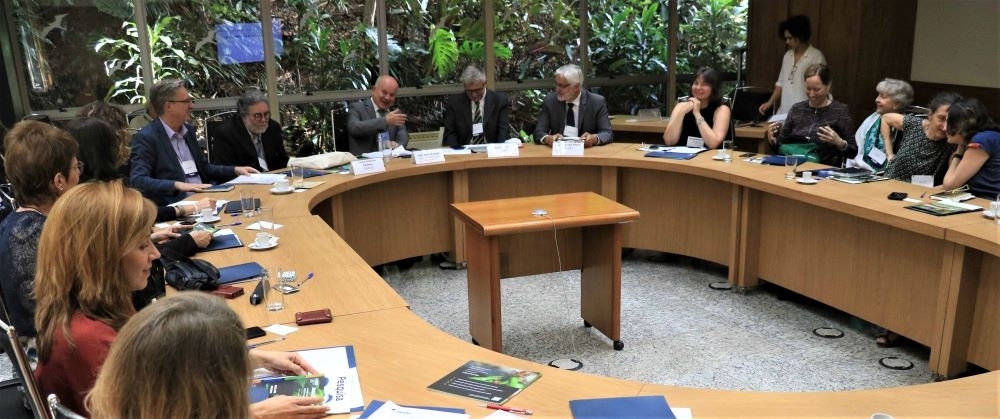


Representatives of German universities, research institutions and funding agencies were welcomed at FAPESP’s headquarters in late March. The Amazon and renewable energy are areas of interest for new bilateral partnerships (photo: Felipe Maeda/Agência FAPESP)
Published on 04/27/2023
By José Tadeu Arantes | Agência FAPESP – Senior executives of FAPESP held a meeting at the end of March with representatives of German universities, research institutions and research funding agencies to strengthen the bilateral ties between Brazil and Germany in education, science, technology and innovation. The participants also discussed ways of fomenting new partnerships.
“Germany has long been a great academic inspiration for Brazil. German scholars and researchers have made major contributions to the organization and development of higher education and research institutions here. In the context of the internationalization process in which FAPESP has been engaged for several years, this relationship is particularly important,” says Ronaldo Aloise Pilli, Vice President of FAPESP’s Board of Trustees.
Pilli welcomed the German delegation alongside Carlos Américo Pacheco, CEO of FAPESP, Luiz Eugênio Mello, then its Scientific Director, and aides.
The German delegation was led by Jochen Hellmann, Director of the Rio de Janeiro office of the German Academic Exchange Service (DAAD), the world’s largest funding organization for the international exchange of students and researchers.
“FAPESP has a long list of cooperation agreements with German institutions, as well as several events scheduled for 2023 and 2024, including the commemoration of 15 years of partnership between FAPESP and DFG [the German Research Foundation], one of Europe’s largest research funding agencies,” Pilli told Agência FAPESP. "We also plan to hold more joint calls for proposals from researchers in both countries. We want to promote exchanges of experience between Brazilian researchers, professors and students and their peers in Germany.”
A list of German higher education institutions and research funders that have cooperation agreements with FAPESP can be found at: fapesp.br/acordos/en.
In informal talks held during the meeting, Hellmann mentioned the challenges faced by Germany in recent years, particularly eurozone inflation. Dealing with this is even more complicated in the context of climate change. “Our dialogue with FAPESP is especially relevant in light of the need for cooperation in the field of energy as a response to the climate crisis,” he said. “Through their efforts in research collaboration, Germany and Brazil can be partners in the search for solutions in this area.”
Hellmann noted that the German Center for Research and Innovation in São Paulo (DWIH São Paulo) is the organization’s only office in the southern hemisphere, underscoring the importance for Germany of its scientific exchange with Brazil.
DWIH comprises offices in six cities around the world that form a global network of research organizations, universities and companies. Overseen by DAAD, they provide a platform for innovation and connect German researchers with local cooperation partners.
The vast difference between the numbers of students from each country living in the other is a challenge. “German universities opened up to foreign students a long time ago. Some 350,000 students with non-German passports are currently living in Germany, or about 13% of the total student body, and 4,000 of them are Brazilians. That’s no small number, but it could be bigger. Unfortunately, despite our efforts we haven’t succeeded in persuading a similar number of German students to live and study in Brazil,” says Marcio Weichert, Program Manager at DWIH São Paulo.
He referred to non-German passports because some foreign students in Germany (including Brazilians) have German passports under dual citizenship laws. There are also many Brazilians in Germany registered as citizens of other EU countries, especially Portugal and Italy.
The First Meeting of the Brazilian ST&I Diaspora in Germany was held online in 2021 (read more at: agencia.fapesp.br/35526). “No one has quantified the diaspora in Germany, but we know Brazilians are participating in more than 60 scientific fields in over 50 German cities,” Roberto Jaguaribe, Brazilian Ambassador to Germany, said during that event.
As Pacheco and Mello emphasized at the March 2023 meeting with the delegation led by Hellmann, the Amazon and renewable energy are research areas that should attract German students. FAPESP is currently taking part in the Amazon+10 Initiative, and since 2008 maintains its Bioenergy Research Program. Both have robust funding.
A possibility raised informally by the German participants in the meeting was the holding of a new FAPESP Week in Germany. FAPESP Weeks have been held in several countries since 2011 to foster an environment in which researchers in Brazil can collaborate with colleagues elsewhere who have common or complementary interests. The last event of the kind held in Germany took place in Munich in 2014. Some members of the delegation suggested it might be time to think about a new edition of the event, possibly in Berlin.
Source: https://agencia.fapesp.br/41256